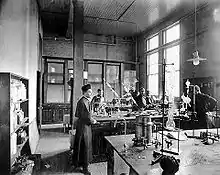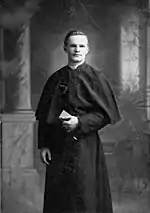Julius Nieuwland
Reverend Julius Aloysius (Arthur) Nieuwland, CSC, PhD, (14 February 1878 – 11 June 1936) was a Belgian-born Holy Cross priest and professor of chemistry and botany at the University of Notre Dame. He is known for his contributions to acetylene research and its use as the basis for one type of synthetic rubber, which eventually led to the invention of neoprene by DuPont.

The Reverend Fr. Julius Aloysius (Arthur) Nieuwland CSC, PhD | |
|---|---|
 Young Julius Nieuwland | |
| Orders | |
| Ordination | 1903 |
| Personal details | |
| Born | 14 February 1878 Hansbeke, Belgium |
| Died | 11 June 1936 (aged 58) Indiana, United States of America |
| Buried | Cedar Grove Cemetery near Notre Dame |
| Alma mater | The University of Notre Dame, The Catholic University of America |
Life and work
Nieuwland's parents emigrated from Hansbeke, Belgium in 1880 to South Bend, Indiana. As a young man, Nieuwland enrolled at the University of Notre Dame, where he studied Latin and Greek and received his undergraduate degree in 1899. He soon after began studies for the priesthood. Ordained in 1903, Nieuwland attended graduate school at The Catholic University of America, where he studied botany and chemistry. During his doctoral studies into the chemistry of acetylene, he discovered the chemical compound lewisite, which would later gain fame as a chemical warfare agent. Nieuwland had to be hospitalized for several days after his exposure to the newly synthesized compound; he did not purify it or otherwise pursue the matter any further.
After receiving his PhD in 1904, Nieuwland returned to Notre Dame as professor of botany until 1918, and subsequently as professor of organic chemistry until 1936. In 1909, Nieuwland founded the peer-reviewed journal American Midland Naturalist acting as its editor until 1934.[1] In 1920, he successfully polymerized acetylene into divinylacetylene. Elmer Bolton, the Director of Research at DuPont, used this basic research during the development of neoprene.
Nieuwland died at the age of 58, and was buried at the Community Cemetery near Notre Dame.[2]
Among Nieuwland's more famous students was Knute Rockne, who became a celebrated Notre Dame football coach. Rockne graduated from Notre Dame with a degree in pharmacy in 1914 and became a chemistry instructor at Notre Dame, while also coaching various sports on campus, from 1915 to 1922.[3][4]
Honors and awards
- Morehead Medal from the International Acetylene Association (1932)[5]
- President of the Indiana Academy of Sciences[6]
- American Institute of Chemists Gold Medal (1935)[7]
- Nichols medal (1935) for "Basic Work on Synthesis from Unsaturated Hydrocarbons"[8]
- Mendel Medal from Villanova University (1936)[9]
- The standard author abbreviation Nieuwl. is used to indicate this individual as the author when citing a botanical name.[10]
- Inducted into the National Inventors Hall of Fame in 1996, Father Nieuwland is notably the only Catholic priest to receive this honor.
See also
- List of Roman Catholic scientist-clerics
- List of National Inventors Hall of Fame inductees
Notes
- McIntosh, Robert P. (1990). "The American Midland Naturalist: the Life History of a Journal" (PDF). The American Midland Naturalist. 123 (1): 1–31. doi:10.2307/2425756. JSTOR 2425756. Retrieved 12 November 2013.
- See the website for the South Bend Area Genealogical Society, particularly the listing of burials at this site along with the cemetery key on this page.
- Notre Dame Archives: Early Teachers: R at archives.nd.edu
- Nieuwland was portrayed by Albert Bassermann in the film Knute Rockne, All American.
- Bogert, Marston Taylor (1935). "Presentation of Professor Julius Arthur Nieuwland, C.S.C., for the Award of the American Institute Medal". Science. 81 (2101): 326–330. doi:10.1126/science.81.2101.326. JSTOR 1660853. PMID 17807080.
- "Past Academy Presidents | Indiana Academy of Science".
- Bogert, Marston Taylor (5 April 1935). "Presentation of Professor Julius Arthur Nieuwland, C.s.c., for the Award of the American Institute Medal". Science. 81 (2101): 326–330. doi:10.1126/science.81.2101.326. PMID 17807080.
- "NY-ACS Nichols Medalists". newyorkacs.org.
- "Past Mendel Medal Recipients". www1.villanova.edu. Retrieved 9 December 2017.
- Brummitt, R. K.; Powell, C. E. (1992). Authors of Plant Names. Royal Botanic Gardens, Kew. ISBN 1-84246-085-4.
Further reading
- Calcott, W. S.; Pope, W. J.; Calcott, W. S.; Edwards, F. W.; More, A. (1937). "Julius Arthur Nieuwland (Obituary)". Journal of the Chemical Society: 708–709. doi:10.1039/JR9370000700.
- Crovello, Theodore J. (October 1978). "Julius A. Nieuwland, C.S.C. 1878–1936". The American Midland Naturalist. 100 (2): 257–260. JSTOR 2424824.
- Filchak, Kenneth E. (April 2009). "In Homage to Our Founder; a Brief Biography of Reverend Julius Aloysious Nieuwland, C.S.C". The American Midland Naturalist. 161 (2): 178–188. doi:10.1674/0003-0031-161.2.178.
- Nieuwland, Julius Arthur (1904). Some Reactions of Acetylene. Notre Dame, Indiana: Notre Dame University Press. (Nieuwland's Catholic University PhD dissertation)
External links
- "Julius Arthur Nieuwland". Archived from the original on 19 May 2009. Retrieved 20 July 2009.
- "Bibliography of Rev. Julius Arthur Nieuwland". Retrieved 20 July 2009.
- Carney, Thomas P. "Synthetics and Smells: Memories of Father Nieuwland". Retrieved 20 July 2009.
- Corson, Dorothy V. "The Story Behind the Handgun He Used to Shoot Leaf Specimens Out of the Trees". Retrieved 20 July 2009.
- "Julius Nieuwland at the National Inventors Hall of Fame". 25 July 2016. Retrieved 21 January 2016.